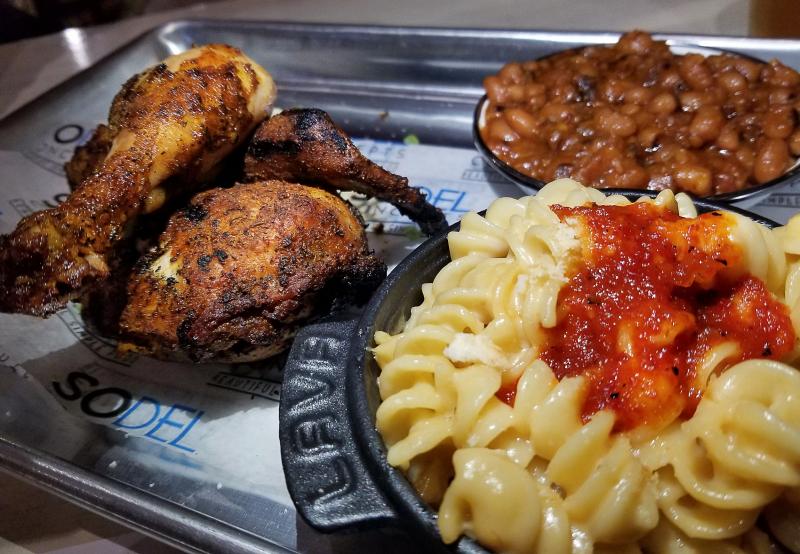Details, details, details! Success depends on the little things

This is my 15th year of watching our Cape Region restaurants adapt to the change of seasons. Some adjust their hours and menu selections. Many offer specials where locals (and smart vacationers) can enjoy savings in various forms. Others put careful consideration into deciding on which weekday to close - and end up doing it on a different day each year. I still remember the words of the late Matt Haley when I interviewed him almost nine years ago for one of my first Cape Gazette columns. “If a restaurant can make it to President’s Day with the lights on, then they’ll survive the summer.” And indeed, whether it’s specials, off-menu wine/beer/bourbon dinners or cooking classes, resort restauranting is all about keeping the lights on until the throngs return in the spring.
Along with that comes the sad roll call of restaurants that didn’t make it - some of them after being open for less than one season. A few years ago in a Delaware Beach Life article I was asked about the restaurants that had closed in the last couple of years. As I was researching my list, it occurred to me that there was a clear and definable reason for every ignominious closing. Washington, D.C. restaurant consultant Jay Coldren of Coldren Hospitality sums it up nicely in his blog: “I explored the genesis of ego-related issues within the restaurant industry and the impact that these big blind spots can have on [a] restaurant’s bottom line. But diagnosing the source of these problems is only the first step. Ego-related problems are always emotionally charged and bringing them to light can challenge the core beliefs of your key people. Business owners need strategies and techniques to combat, harness and redirect the source of these hurdles in a way that contributes to the success of the business.” Well said, and 100 percent borne out when a few failed owners - not all, mind you - chose to blame “the economy” rather than their own lack of skill, operating capital, or whatever. I wonder if that failure to take responsibility for their actions helped to hasten their demise.
Each of the restaurants that piously blamed “the economy” for their closure had serious flaws. The lack of server training is one that is most obvious to customers; in fact, it is the primary subject of daily emails I receive from disappointed patrons. For a young person taking a job in a restaurant, the lack of comprehensive and organized training translates into ownership and/or management’s lack of concern for customer service. “If the owner can’t be bothered to train me,” they say, “then I’ll just wing it.” They wing it, and voila! - people go once and never return. In fact, at one now-defunct eatery, I asked the server about the preparation of a particular dish. This triggered an annoying soliloquy centered on the fact that she was a vegetarian and would never eat that. Blah, blah, blah. A properly trained server would never have done that. The same problem can happen in the kitchen. Personnel who lack oversight have no incentive to check - and double check - the accuracy of orders. Quality restaurants employ expeditors to do that job, and well-run restaurants take the “expo” station very seriously. One example is last week’s opening of Thompson Island Brewing Company in Rehoboth Beach. I watched with admiration as Doug Ruley - longtime SoDel Concepts chef and now vice president of SoDel Concepts’ culinary operations - took on the job of expediting; inspecting, critiquing and occasionally rearranging every dish before it was delivered to the guest. Some he even sent back into the kitchen for correction. Matt Haley would have been proud, and this could explain why SoDel Concepts is successful enough to keep hundreds of local people gainfully employed at their 12 year-round eateries.
Without an expeditor or any oversight in general, orders that come out wrong are delivered with wide-eyed innocence by apathetic servers. Apologies are few and far between simply because they don’t know any better. On a visit to a place that closed several years ago, a simple ham and cheese sandwich took 45 minutes (the restaurant was empty). I mentioned that to the owner who stared back at me in expressionless silence. A fellow restaurateur in Bethesda, Md., used to amaze me by never being on the premises. As he finally locked the door for the last time, he claimed that he was a victim of his (largely untrained) staff and, yup, “the economy.”
Of course financial difficulties are real and can wreak havoc on many industries. But the fact remains that there are restaurants that do stay busy most of the time. Anyone who dines out regularly can name their own list of busy winter spots. In my years of being up close and personal with this aspect of the food industry, I believe that it all boils down to four qualities that successful eateries have in common: (1) You will almost always find the owner(s) or a skilled, well-paid manager on the premises tending bar, bussing tables, greeting guests or cooking. (2) Smart restaurateurs adapt quickly to economic changes with careful menu and price management, smart advertising and strategic cost control. (3) They make heartfelt efforts to right the inevitable wrongs, and most importantly, (4) the staff admires and respects them - mainly because of reasons 1, 2 and 3.
A restaurant is nothing more than human beings who need imperfection and mistakes in order to learn. A smart owner or manager turns that to his or her advantage in order to monitor and improve the guests’ experiences. After a while, perfection can actually become a habit if a team is properly trained and motivated.
Running a consistently successful restaurant is one of the hardest jobs on the planet. It’s almost like you start anew every day. People who make that work don’t have time to worry about “the economy.” In this business of eating, consistently good food and service beat the economy every time.





















































